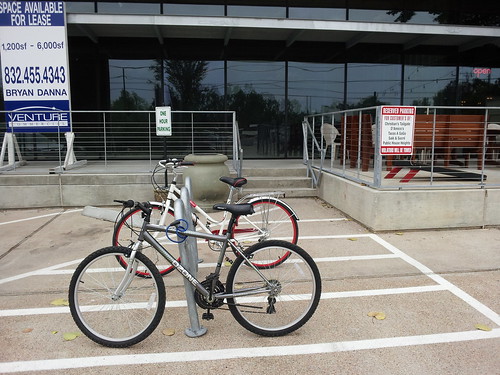Nice.
Bicycle advocates are cheering a city proposal that would give businesses an incentive to offer bike parking and would require some properties to provide it for the first time, saying the ideas mark a cultural shift in Houston.
“This is a first for Houston and a sign of how our city is evolving,” Mayor Annise Parker said. “It recognizes the popularity of cycling and gives a nod to the fact that there are other modes of transportation besides automobiles.”
The bike-related ideas are included in a proposed rewrite of the city’s off-street parking ordinance, largely untouched since it was passed in 1989. The proposal is expected to go before City Council soon. Debate over the rewrite mainly has focused on its impact on bars and restaurants, many of which would be required to provide more parking.
The city initially had exempted only freestanding restaurants and bars smaller than 2,000 square feet from the higher parking requirements; independent restaurateurs wanted all establishments smaller than 4,500 square feet to be exempt. The sides appear to have reached an agreement that would exempt all restaurants smaller than 3,000 square feet and all bars smaller than 2,500 square feet.
[…]
Under the proposed revisions, new retail, commercial and office buildings 5,000 square feet or larger would need to provide one bike parking space, with another bike space required for every additional 25,000 square feet, up to a maximum of six spaces.
The ordinance also would allow any property, other than single-family homes, to reduce required car parking by up to 10 percent by trading one car space for four bike spaces. A 10,000-square-foot retail business, for instance, could drop its required 40 car spaces to 36 by increasing its bike parking from the required one space to 17.
As you know, I wholeheartedly approve of this. I wouldn’t mind seeing more flexibility on trading car spaces for bike spaces, but the fact that it’s happening at all is a big deal. Even better, the group that has been agitating the most forcefully for this sort of accommodation supports the proposal.
Brian Crimmins, chief of staff in the city Planning Department, also noted that the ability of any business (except single-family homes) to trade up to 10 percent of its required parking for additional bike parking spaces would still apply to all restaurants and bars (even those exempt from the higher parking requirements). That would allow these businesses to drop their car parking to essentially match OKRA’s proposal, he said.
In an email to top city staffers confirming the agreed changes, OKRA president Bobby Heugel said his group plans to vocally support the ordinance if it moves forward as negotiated.
“The manner in which our views were received and incorporated into Chapter 26 is exciting and encouraging as OKRA is new to the local political process,” he wrote. “It’s nice to know that participation can make a difference, and that the sharing of perspectives can result in policies in which a variety of stakeholders concerns(‘) are represented.”
You can see some more detail about the proposals as well as the full text of what the city has out forward and what OKRA had countered with.
The Chron editorializes in favor of the new approach, also with a desire to see it go farther.
We’re pleased that the new regulations include cutouts that allow different neighborhoods to create systems that are right for them. Among the added flexibility – such as reducing parking requirements for historic districts, letting bicycle parking replace a certain number of car spots and allowing shared parking lots – are Special Parking Areas. These would allow management entities to set their own parking management plan – with approval from City Hall.
This flexibility makes the proposed changes a vast improvement over the previous regulations, and the folks at City Hall say they’re trying to engage business owners so they can take advantage of the new rules on day one. City Hall could show more good faith by adopting recommendations by OKRA – the Organized Kollaboration of Restaurant Affairs – to allow more types of bars to be exempted from the higher parking minimums.
Residents worried about parking overflow can protect their neighborhoods by applying for permit parking on their streets, as many cocktail fans have learned while chasing down a tow truck.
But there is a price for living in walkable, dynamic neighborhoods, and it includes folks parking in front of your house. That is a price inner-loop Houstonians should be happy to pay.
Agreed.

